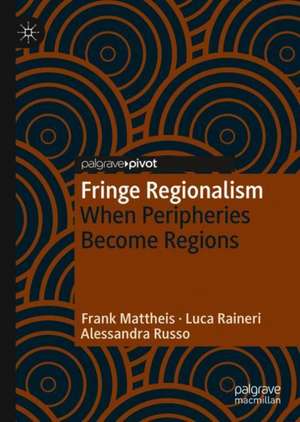Fringe Regionalism: When Peripheries Become Regions
Autor Frank Mattheis, Luca Raineri, Alessandra Russoen Limba Engleză Hardback – 26 sep 2018
Preț: 408.81 lei
Nou
Puncte Express: 613
Preț estimativ în valută:
78.26€ • 80.49$ • 64.93£
78.26€ • 80.49$ • 64.93£
Carte tipărită la comandă
Livrare economică 18 februarie-04 martie
Preluare comenzi: 021 569.72.76
Specificații
ISBN-13: 9783319974088
ISBN-10: 3319974084
Pagini: 100
Ilustrații: XIV, 97 p.
Dimensiuni: 148 x 210 mm
Greutate: 0.29 kg
Ediția:1st ed. 2019
Editura: Springer International Publishing
Colecția Palgrave Pivot
Locul publicării:Cham, Switzerland
ISBN-10: 3319974084
Pagini: 100
Ilustrații: XIV, 97 p.
Dimensiuni: 148 x 210 mm
Greutate: 0.29 kg
Ediția:1st ed. 2019
Editura: Springer International Publishing
Colecția Palgrave Pivot
Locul publicării:Cham, Switzerland
Cuprins
1. Introductory remarks – the case for fringe regionalism.- 2. Producing regional spaces from the margins: Fringe regionalism - a conceptual proposal to recalibrate the study of regions.- 3. The practice of fringe regionalism - evidence from the Caucasus and the Sahara.- 4. Towards a wider application of fringe regionalism – comparisons and transfers
Notă biografică
Frank Mattheis is Research Fellow at the Institut d’études européennes (IEE), Université libre de Bruxelles, Belgium, and Associate Researcher at the Centre for the Study of Governance Innovation (GovInn), University of Pretoria, South Africa.
Luca Raineri is Research Fellow at the Sant'Anna School of Advanced Studies of Pisa, Italy.
Alessandra Russo is Post-Doctoral Researcher at the Centre Emile Durkheim, Sciences Po Bordeaux, France.
Textul de pe ultima copertă
This book introduces the novel concept of fringe regionalism to the field of international studies. It examines how regions are practiced by peripheral borderlands rather than centrally planned, thus offering new avenues for researching regionalism beyond the conventional focus on formal intergovernmental organisations. Two in depth case studies, the Sahara and the Caucasus, provide the real-life application of the concept and the authors use the tensions between competing demarcations of the region, the regional nature of extra-legal economies and the narratives of cross-border identities to steer their empirical approach. Through thorough analysis, the volume applies the concept of fringe regionalism to regions previously neglected by conventional approaches.
Frank Mattheis is Research Fellow at the Institut d’études européennes (IEE), Université libre de Bruxelles, Belgium, and Associate Researcher at the Centre for the Study of Governance Innovation (GovInn), University of Pretoria, South Africa.
Luca Raineri is Research Fellow at the Sant'Anna School of Advanced Studies of Pisa, Italy.
Alessandra Russo is Post-Doctoral Researcher at the Centre Emile Durkheim, Sciences Po Bordeaux, France.
Frank Mattheis is Research Fellow at the Institut d’études européennes (IEE), Université libre de Bruxelles, Belgium, and Associate Researcher at the Centre for the Study of Governance Innovation (GovInn), University of Pretoria, South Africa.
Luca Raineri is Research Fellow at the Sant'Anna School of Advanced Studies of Pisa, Italy.
Alessandra Russo is Post-Doctoral Researcher at the Centre Emile Durkheim, Sciences Po Bordeaux, France.
Caracteristici
Challenges the dominant bias in the study of regionalism to privilege formal intergovernmental organisations Analyses how regions are produced from borderlands and peripheries through transnational delineations, practices, economies and identities Approaches regionalism in a transdisciplinary perspective by drawing on border studies, political geography, studies of informality, the recent scholarship on the “practical turn” in international relations and transnational politics
